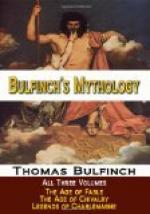The Tartar king had leaped on his saddle the moment he saw his enemy, and when the paladin had done speaking, he said in a mild voice, “Without doubt you are the best knight I ever encountered, and fain would I leave you untouched for your own sake, if you would cease to hinder me from rallying my people. I pretended to fly, in order to bring you out of the field. If you insist upon fighting I must needs fight and slay you, but I call the sun in the heavens to witness I would rather not. I should be very sorry for your death.”
The Count Orlando felt pity for so much gallantry, and he said, “The nobler you show yourself the more it grieves me to think that in dying without a knowledge of the true faith you will be lost in the other world. Let me advise you to save body and soul at once. Receive baptism, and go your way in peace.”
Agrican replied: “I suspect you to be the paladin Orlando. If you are I would not lose this opportunity of fighting with you to be king of Paradise. Talk to me no more about your things of another world, for you will preach in vain. Each of us for himself, and let the sword be umpire.”
The Saracen drew his sword, boldly advancing upon Orlando, and a combat began, so obstinate and so long, each warrior being a miracle of prowess, that the story says it lasted from noon till night. Orlando then seeing the stars come out was the first to propose a respite.
“What are we to do,” said he, “now that daylight has left us?”
Agrican answered readily enough, “Let us repose in this meadow, and renew the combat at dawn.”
The repose was taken accordingly. Each tied up his horse, and reclined himself on the grass, not far from the other, just as if they had been friends, Orlando by the fountain, Agrican beneath a pine. It was a beautiful clear night, and, as they talked together before addressing themselves to sleep, the champion of Christendom, looking up at the firmament, said, “That is a fine piece of workmanship, that starry spectacle; God made it all, that moon of silver, and those stars of gold, and the light of day, and the sun,—all for the sake of human kind.”
“You wish, I see, to talk of matters of faith,” said the Tartar. “Now I may as well tell you at once that I have no sort of skill in such matters, nor learning of any kind. I never could learn anything when I was a boy. I hated it so that I broke the man’s head who was commissioned to teach me; and it produced such an effect on others that nobody ever afterwards dared so much as show me a book. My boyhood was therefore passed, as it should be, in horsemanship and hunting, and learning to fight. What is the good of a gentleman’s poring all day over a book? Prowess to the knight, and preaching to the clergyman, that is my motto.”
“I acknowledge,” returned Orlando, “that arms are the first consideration of a gentleman; but not at all that he does himself dishonor by knowledge. On the contrary, knowledge is as great an embellishment of the rest of his attainments, as the flowers are to the meadow before us; and as to the knowledge of his Maker, the man that is without it is no better than a stock or a stone or a brute beast. Neither without study can he reach anything of a due sense of the depth and divineness of the contemplation.”




